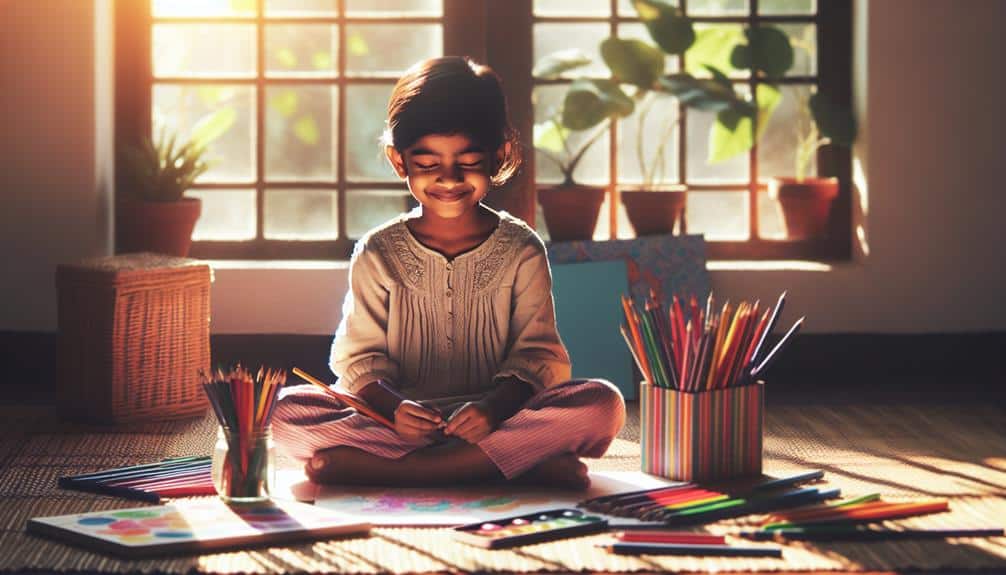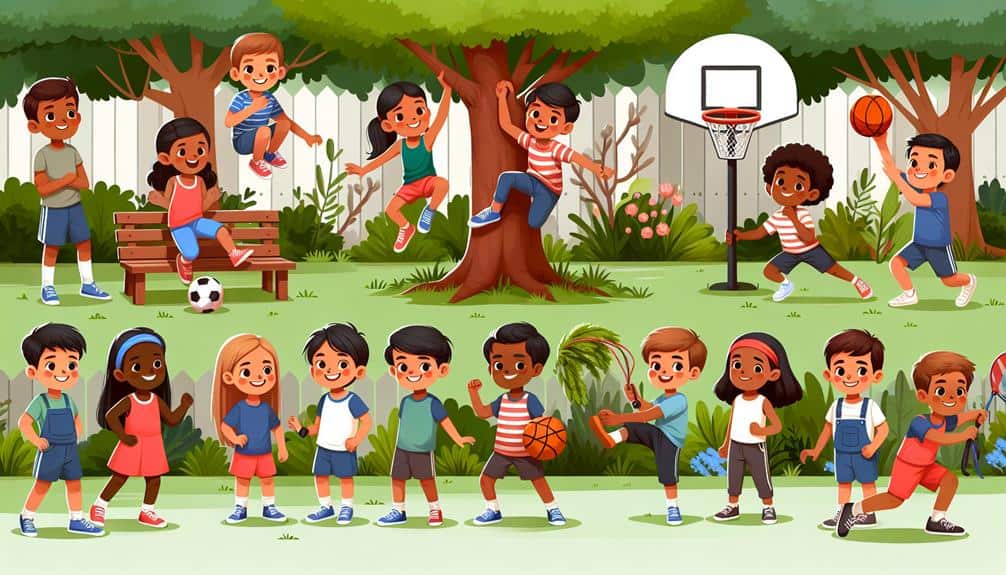Enhance your homeschooling children's focus, emotional well-being, and cognitive skills with mindfulness exercises. Deep breathing improves concentration by calming the mind and signaling the brain to focus. Mindful drawing enhances listening skills and sharpens concentration through sound meditation. Yoga aids in relaxation and movement, boosting focus, and promoting physical well-being. Nature-based practices foster attentiveness, creativity, and calmness through outdoor exploration. Innovative learning activities like painting and sculpting develop critical thinking and problem-solving skills. Gratitude practices promote appreciation and resilience, enhancing overall well-being. Try these exercises to support your children's growth and development.
Key Points
- Deep breathing exercises enhance focus and emotional well-being.
- Mindful listening activities sharpen concentration and presence.
- Yoga promotes relaxation, movement, and improved concentration.
- Nature-based practices foster attentiveness, creativity, and calmness.
- Gratitude practices develop appreciation, resilience, and grounding.
Benefits of Mindfulness for Homeschooling
Embracing mindfulness practices in homeschooling can greatly enhance your child's focus and emotional well-being. Incorporating mindful movement into your child's routine can help them release pent-up energy and improve their concentration. Activities like yoga or simple stretching exercises not only promote physical health but also encourage a sense of calmness and presence in the moment.
Furthermore, engaging in mindful creativity activities, such as drawing, painting, or crafting, can foster your child's imagination and problem-solving skills. These activities allow children to express themselves freely, reduce stress, and enhance their cognitive abilities. Encouraging your child to explore their creativity mindfully can also improve their mood and overall well-being.
Breathing Exercises for Focus
Enhancing your child's focus during homeschooling can be achieved through simple yet effective breathing exercises. Mindfulness techniques such as deep breathing can help your child calm their mind and improve concentration.
Encourage your child to take deep breaths in through the nose and slowly exhale through the mouth. This simple act can signal to the brain that it's time to focus, reducing distractions and promoting a sense of calm.
Incorporating relaxation techniques like breathing exercises into your child's daily routine can serve as powerful concentration exercises. By practicing these focus activities regularly, your child can develop the ability to center their attention on the task at hand.
As they become more adept at controlling their breathing, they'll likely experience improved focus and productivity during homeschooling sessions. Remember, consistency is key when it comes to reaping the benefits of these mindfulness practices.
Mindful Listening Activities
Engage your child in mindful listening activities to cultivate their ability to focus and be fully present in the moment.
Mindful drawing is a wonderful way to enhance your child's listening skills. Encourage them to close their eyes and truly listen to the sounds around them while creating art. This activity can help them develop a deeper connection between their senses and their creative expression.
Sound meditation is another powerful practice to incorporate into your child's routine. Find a comfortable sitting position and play calming sounds such as waves crashing or birds chirping. Guide your child to focus solely on the sounds, letting go of any distracting thoughts.
This can promote relaxation and sharpen their ability to concentrate on a single stimulus.
Yoga for Relaxation and Movement
When exploring yoga for relaxation and movement with your homeschooling children, remember that breathing techniques can help them unwind and de-stress.
Encouraging them to try different poses can also aid in boosting focus and concentration during their learning activities.
Incorporating these yoga practices into their routine can promote a sense of calm and physical well-being.
Breathing for Relaxation
Practicing mindful breathing can be a powerful tool to help homeschooling children relax and find calm amidst their daily activities. Deep breathing and meditation techniques can provide a sense of grounding and help manage stress and anxiety.
As a homeschooling parent, incorporating simple breathing exercises into your child's routine can have numerous benefits. Encourage your child to take a moment to sit comfortably, close their eyes, and focus on their breath.
Inhale deeply through the nose, feeling the breath fill their lungs, then exhale slowly through the mouth, releasing any tension. This practice can help them center their thoughts and emotions, promoting a sense of relaxation and clarity.
Poses for Focus
To enhance your child's focus and promote relaxation through movement, incorporating yoga poses into their daily routine can be highly beneficial. Mindfulness postures and concentration techniques found in yoga can help your child cultivate a sense of calm and centeredness, essential for learning and focusing on tasks.
Yoga poses like the Tree Pose, Warrior Pose, and Child's Pose are great for improving concentration and reducing stress. Encouraging your child to practice these poses regularly can aid in developing their ability to stay present and attentive during homeschooling activities.
Incorporating meditation techniques, such as focusing on the breath while holding a pose, can further enhance your child's mindfulness and ability to concentrate. Encourage them to take a few moments each day to practice these techniques, helping them build resilience and mental clarity.
Nature-Based Mindfulness Practices
Engage your homeschooling children in nature-based mindfulness practices to foster a deeper connection with the natural world and promote relaxation and focus.
Outdoor exploration can be a wonderful way to instill mindfulness in your child's routine. Encourage them to observe the intricate details of nature – the patterns of leaves, the chirping of birds, or the feel of the earth beneath their feet. This simple act of being present in nature can help them cultivate a sense of calm and attentiveness.
Nature journals are another valuable tool for mindfulness. Encourage your child to keep a journal where they can record their observations, thoughts, and feelings about the natural world. This practice not only enhances their connection with nature but also serves as a reflective exercise that can improve their focus and creativity.
Mindful Art and Creativity Sessions
Engaging in mindful art and creativity sessions can be a powerful tool in honing your child's focus and enhancing their learning experience.
Through artistic expression, children can tap into their creativity, allowing them to explore ideas and concepts in a unique and personalized way.
Encouraging artistic activities can foster a sense of mindfulness, helping your child stay present and engaged in their homeschooling journey.
Art for Focus
Immerse yourself in mindful art and creativity sessions to enhance focus and cultivate a sense of presence in your homeschooling routine. Art therapy can be a powerful tool for children to express themselves, relax, and improve concentration. Through mindful coloring, kids can engage in a calming activity that encourages them to focus on the present moment.
Art for focus isn't just about creating something visually appealing; it's about the process itself. When children participate in mindful art sessions, they learn to pay attention to their thoughts and feelings without judgment. This practice can help them develop better self-awareness and emotional regulation skills, which are valuable in their learning journey.
Encouraging your child to explore different art mediums and techniques can also boost their creativity and problem-solving abilities. By incorporating art into your homeschooling curriculum, you provide a holistic approach to education that nurtures both the mind and the soul.
Creativity in Learning
Encouraging your child to embrace creativity through mindful art and creativity sessions can foster a deeper connection to learning and enhance their overall educational experience. By engaging in mindful art activities, your child can tap into their imagination exploration, allowing them to express themselves in unique and innovative ways. These sessions provide a safe space for your child to experiment with different mediums, colors, and techniques, fostering a sense of freedom and self-expression.
Mindful art and creativity sessions not only stimulate your child's creativity but also promote innovative learning. Through hands-on activities like painting, drawing, or sculpting, your child can develop critical thinking skills, problem-solving abilities, and a deeper understanding of their own emotions. By encouraging them to think outside the box and explore new ideas, these sessions can help your child approach learning in a more open-minded and imaginative way.
Incorporating mindful art and creativity sessions into your homeschooling routine can inspire your child to embrace their creativity, think creatively, and approach learning with a sense of curiosity and wonder.
Gratitude and Mindfulness Practices
Practicing gratitude and mindfulness with your homeschooling children can foster a sense of appreciation and presence in their daily lives. Encouraging them to keep a gratitude journal where they jot down things they're thankful for each day can help them focus on the positive aspects of their lives. This practice can enhance their overall well-being and resilience.
Incorporating mindful movement activities like yoga or tai chi into their daily routine can also aid in grounding your children and promoting a sense of calmness. Engaging in these practices can help them become more attuned to their bodies and emotions, leading to better self-regulation skills.
Frequently Asked Questions
How Can Mindfulness Help Improve a Child's Social Skills?
Mindfulness can enhance your child's social skills by fostering emotional regulation, improving empathy, and enhancing communication skills. By being present in social interactions, you can better understand others and effectively navigate various social situations.
Are There Mindfulness Exercises Specifically for Reducing Test Anxiety?
When feeling anxious about tests, try breathing techniques to calm your mind. Visualization exercises can help you see success. Progressive relaxation eases tension. Repeat positive affirmations to boost confidence. Mindfulness can ease test anxiety.
Can Mindfulness Practices Enhance a Child's Creativity and Imagination?
Mindfulness practices can truly enhance a child's creativity and imagination. In fact, studies show that regular mindfulness activities can boost imaginative thinking by up to 50%. Incorporating mindfulness into play and art can further nurture these skills.
Are There Mindfulness Techniques to Help Children With Adhd?
When dealing with ADHD, focus techniques like mindful breathing and body scans can help. Incorporating calming strategies such as visualization or mindful movement can also aid in managing symptoms and promoting a sense of inner peace.
How Can Mindfulness Activities Be Integrated Into Daily Homeschool Routines?
Incorporating mindfulness breaks into daily routines can enhance parent-child bonding and promote mindful movement. By integrating these activities seamlessly, you can create a calm and focused homeschool environment that nurtures well-being.



